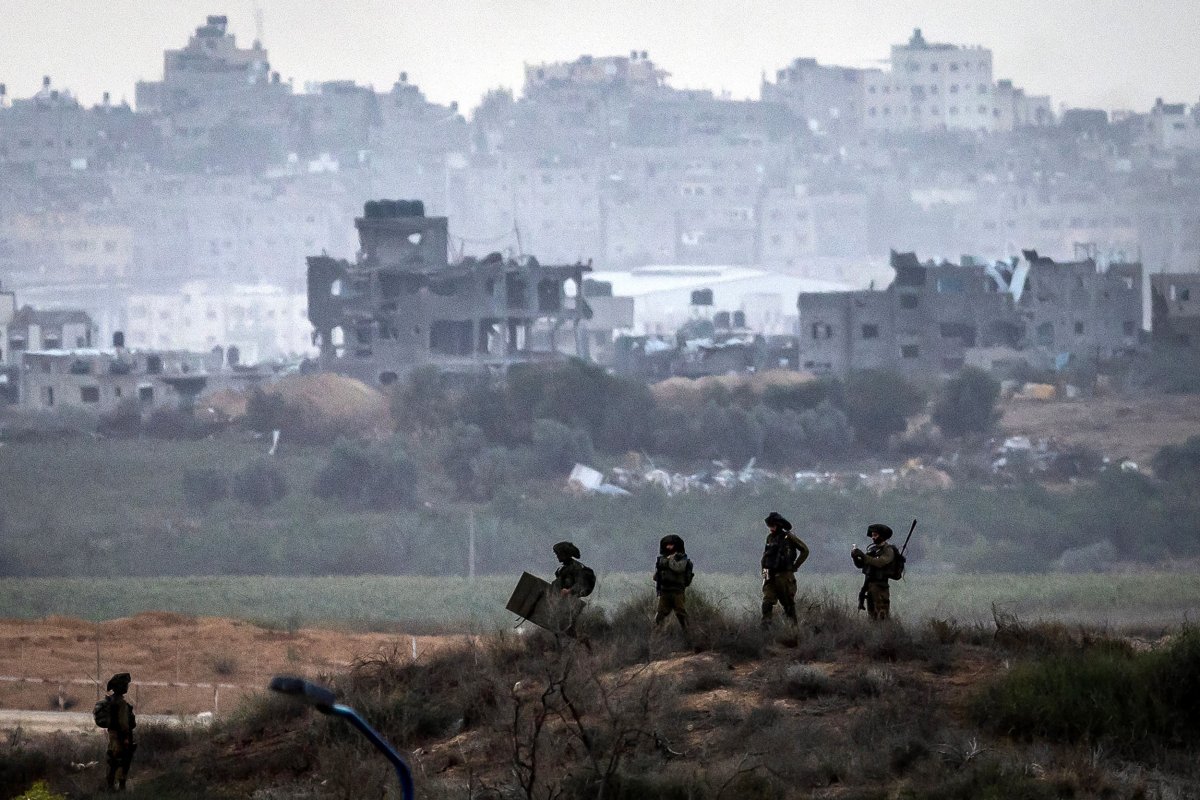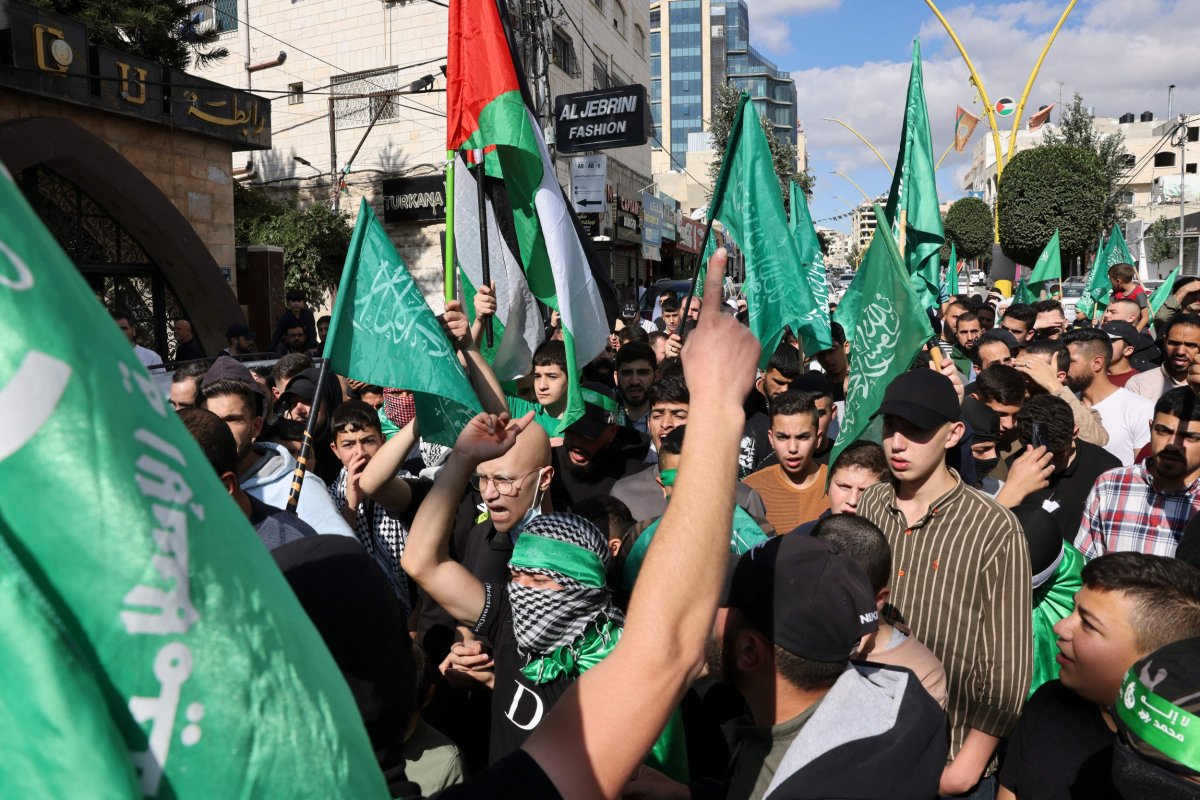Israel is playing with high stakes as its troops dismantle the Hamas militant group inside the devastated Gaza Strip, with unyielding yet unclear commitments by its leaders prompting fears that the culminating showdown with Hamas will prove the beginning—not the end—of a new era of regional violence.
Eventually, Israel's "mission accomplished" moment will arrive. Hamas is no match for the Israel Defense Forces, whose units have quickly pushed through Gaza's ravaged urban environment with relatively light Israeli casualties. The IDF is now fighting into what it says are vital Hamas command centers in the heart of Gaza City.
But the mission set out by Prime Minister Benjamin Netanyahu and his emergency coalition allies was to "crush and destroy" the Islamist group across the region. Five weeks into the war, Hamas' top political and military leaders are still in action, hundreds of Israeli hostages are still unaccounted for, and there is still no clear plan for how to control Gaza after—or rather if—Hamas is ejected from the Palestinian territory.
The Israeli-occupied West Bank is already enflamed, with more than 160 Palestinians there killed by the IDF and extremist settlers since the Hamas attack into southern Israel on October 7, according to The Associated Press. Hamas is strong in the West Bank despite nominal Palestinian Authority—dominated by Fatah—control, and its armed cells are likely to continue operations. Meanwhile, fighting with the Lebanese Hezbollah movement continues on the northern border, while Houthi missiles and drones attack from the Red Sea.

When American President George W. Bush declared Operation Iraqi Freedom "accomplished" in May 2003, few in his administration seemingly foresaw the depths of regional chaos and violence yet to come. The same could yet prove true for Netanyahu, whose storied and divisive political career does not look likely to survive beyond his latest Gaza war.
Hamas Underground
The IDF is currently fighting its way into the dense Gaza City area, searching for tunnels, bunkers and arsenals used by the Hamas leadership to plan and execute attacks into Israel. But the attack into the northern part of the Strip is likely only the first part of a much longer operation, Michael Milshtein—the former head of the IDF Military Intelligence's Department of Palestinian Affairs—told Newsweek.
"Israel of course, we will have to continue with the offensive," Milshtein—now working at the Moshe Dayan Center for Middle Eastern and African Studies at Tel Aviv University—said. "First of all, to the refugee camps of the southern part of Gaza. After that, the cities of Khan Younis and then Rafah, and then to complete the occupation of Gaza, cleaning it of Hamas."
"Hamas is actually right now focused in in the southeastern part of Gaza, mainly the city of Khan Younis," Milshtein said.
The city is the hometown of both Hamas' Gaza Strip leader Yahya Sinwar and Mohammed Deif, the commander of the Hamas military wing known as the Al-Qassem Brigades. On Thursday, the IDF dropped leaflets ordering Palestinians to evacuate four towns on the outskirts of Khan Younis ahead of an expected bombardment.
But destroying a guerrilla resistance organization with deep ties in the Palestinian population may not be feasible. "It is more likely that it will never be cleaned, than a scenario in which you will erase Hamas," Milshtein said. "Hamas is an idea, it's an ideology."
That ideology will be boosted by the killing of at least 11,470 Palestinians—a toll reported by AP, citing Palestinian Health Ministry figures—since October 7, when Hamas' infiltration attack in southern Israel killed around 1,200 people.
Even in political defeat, Hamas could reform itself as a purely political force and claim to have renounced its armed wing, Milshtein said. "The more negative scenario is that Hamas will act as an underground force, they will try to undermine any kind of situation or agreement that will be created in Gaza."
Gaza's Future
Unseating Hamas in Gaza will create a power vacuum. The group has held sway there since a coup against Fatah in 2007, and Israeli forces have not maintained a permanent presence there since 2005. Defense Minister Yoav Gallant has promised "a new security reality" in Gaza post-war, but no one seems to know what that is.
Netanyahu appears to have dashed any prospect of the PA's return, or of an international oversight effort to help rebuild the devastated Strip. Israel, he said, will retain "overall security responsibility" for the Gaza Strip "for an indefinite period." Figures including President Joe Biden have warned it would be a "big mistake" for Israeli forces to re-occupy Gaza.

"Nobody really knows" what the scenario will be in the immediate aftermath of the ground invasion, Milshtein said. "You cannot ignore it. Every kind of problem or challenge that will emerge in Gaza will directly influence Israel's national security."
"Even after Sinwar and Deif are killed, the Hamas political bureau vanished, the rocket arsenal and all the other weapons of Hamas erased, I do think that Hamas is going to be a challenge to any future scenario in Gaza."
"Gaza is going to be almost destroyed," he added. "They will have to really reconstruct Gaza and build it up from the beginning...Israel should, or attempt to, establish a local administration based on local powers that include the heads of clans, tribes, NGOs, all kinds of heads of professional associations, and others."
Uncommon Knowledge
Newsweek is committed to challenging conventional wisdom and finding connections in the search for common ground.
Newsweek is committed to challenging conventional wisdom and finding connections in the search for common ground.
About the writer
David Brennan is Newsweek's Diplomatic Correspondent covering world politics and conflicts from London with a focus on NATO, the European ... Read more
To read how Newsweek uses AI as a newsroom tool, Click here.






